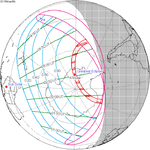Solar eclipse of December 2, 1956
| Solar eclipse of December 2, 1956 | |
|---|---|
 Map | |
| Type of eclipse | |
| Nature | Partial |
| Gamma | 1.0923 |
| Magnitude | 0.8047 |
| Maximum eclipse | |
| Coordinates | 67°54′N 64°36′E / 67.9°N 64.6°E |
| Times (UTC) | |
| Greatest eclipse | 8:00:35 |
| References | |
| Saros | 151 (11 of 72) |
| Catalog # (SE5000) | 9413 |
A partial solar eclipse occurred on December 2, 1956. A solar eclipse occurs when the Moon passes between Earth and the Sun, thereby totally or partly obscuring the image of the Sun for a viewer on Earth. A partial solar eclipse occurs in the polar regions of the Earth when the center of the Moon's shadow misses the Earth.
Related eclipses[]
Solar eclipses of 1953–1956[]
This eclipse is a member of a semester series. An eclipse in a semester series of solar eclipses repeats approximately every 177 days and 4 hours (a semester) at alternating nodes of the Moon's orbit.[1]
Note: Partial solar eclipse of February 14, 1953 and August 9, 1953 belong to the last lunar year set.
| Solar eclipse series sets from 1953–1956 | ||||
|---|---|---|---|---|
| Descending node | Ascending node | |||
| Saros | Map | Saros | Map | |
| 116 |  1953 July 11 Partial |
121 |  1954 January 5 Annular | |
| 126 |  1954 June 30 Total |
131 |  1954 December 25 Annular | |
| 136 |  1955 June 20 Total |
141 |  1955 December 14 Annular | |
| 146 |  1956 June 8 Total |
151 |  1956 December 2 Partial | |
References[]
- Earth visibility chart and eclipse statistics Eclipse Predictions by Fred Espenak, NASA/GSFC
- ^ van Gent, R.H. "Solar- and Lunar-Eclipse Predictions from Antiquity to the Present". A Catalogue of Eclipse Cycles. Utrecht University. Retrieved 6 October 2018.
Categories:
- Partial solar eclipses
- 1956 in science
- 20th-century solar eclipses
- December 1956 events
- Solar eclipse stubs



